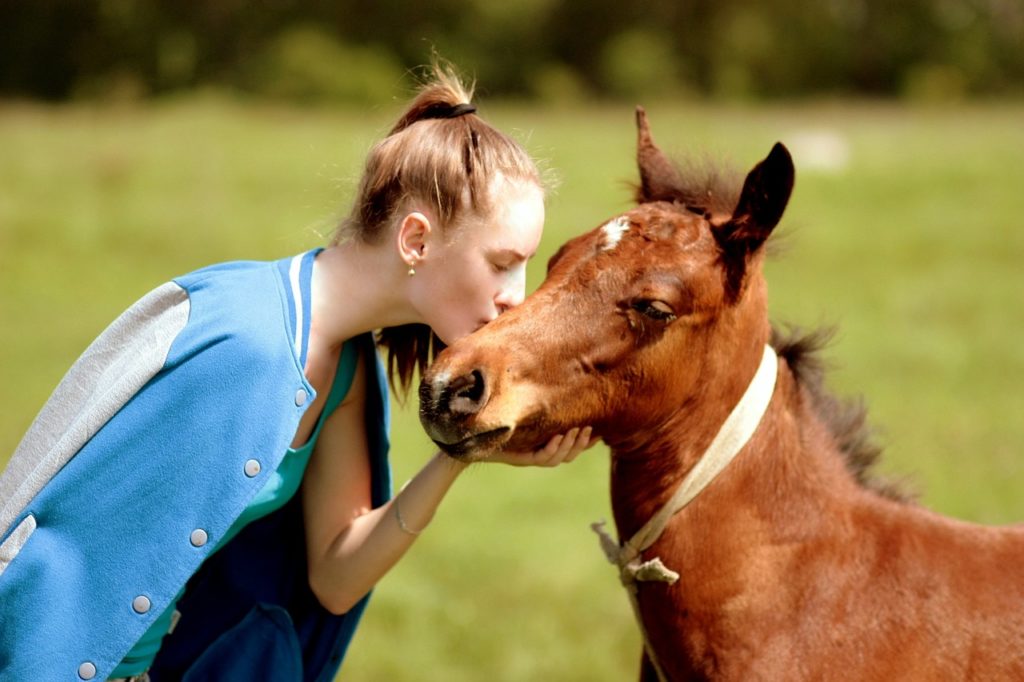- Calls to this hotline are currently being directed to Within Health, Fay or Eating Disorder Solutions
- Representatives are standing by 24/7 to help answer your questions
- All calls are confidential and HIPAA compliant
- There is no obligation or cost to call
- Eating Disorder Hope does not receive any commissions or fees dependent upon which provider you select
- Additional treatment providers are located on our directory or samhsa.gov
Animals & Their Impact on Eating Disorder Recovery

Contributor: Courtney Howard, B.A., Executive Assistant at Eating Disorder Hope and Addiction Hope
Animals are often capable of providing unconditional love in a unique and beautiful way. This makes spending time with animals a valuable coping tool for individuals in eating disorder recovery.
The physical health benefits of spending time with animals have been actively studied for the past few decades. One of the first studies in the early 1980s [1] found that exposure to dogs with whom a companion bond had been formed actually lowered participants’ blood pressure, similar to the relaxing effects of reading a book.
However, the potential mental health benefits of dogs and other animals are just now being explored. Shannon Kopp, an eating disorder and animal rights advocate, explains the role shelter dogs played in her own recovery in her new book, Pound for Pound: A Story of One Woman’s Recovery and the Shelter Dogs Who Loved Her Back to Life.
New Book Explores Shelter Dogs & Recovery
Pound for Pound shares Shannon Kopp’s personal journey and how working at the San Diego Humane Society was a turning point in her recovery. Though she had sought treatment in the past for bulimia nervosa, she was still active in her eating disorder when she began working at the shelter.
The shelter dogs were also going through a difficult time, so they connected on a unique level and were able to find comfort in each other without judgment. What Kopp describes as an “…outpouring of love between a girl and a dog…” is what helped her process her feelings without engaging in her eating disorder. This led to her healing and ultimate recovery.
Kopp is still able to use spending time with shelter dogs and other animals as a healthy coping skill in her day-to-day life. One of the keys to recovery is developing these healthy coping skills. If you love animals, spending time at a local shelter or fostering a rescue dog might be a great place to start. Providing unconditional love and receiving it in return is a truly magical thing.
Programs Using Animals to Aid Mental Health
Experts within the field recognize these effects and have established programs ranging from mental health service dogs to equine therapy and more.
UCLA launched the People-Animal Connection (PAC) in 1994 and has continued to provide forms of animal therapy to individuals throughout Southern California. The program recently partnered with Reading is the Way Up to provide children at pediatric hospitals with a furry buddy to read to. By reading aloud to an animal, many of these children are able to keep their reading levels (and their spirits) up while hospitalized.
PAC also partnered with Operation Mend to send a special golden retriever to visit Gulf War veterans currently undergoing surgery for injuries sustained in battle years ago. Volunteers state there is an incredible shift when patients are introduced to the canine.
Aubrey Fine, Ed.D., a psychologist from California State Polytechnic University, is a firm believer in using animals in therapy sessions with children and adolescents. Dr. Fine explains that this applies not only to dogs, but also to the cockatoo and bearded dragon that he uses in his own private practice. Children are typically more comfortable around animals, making it easier for clinicians to get through to their younger clients and to the root of their distress.
How to Get Involved
 If you are in recovery and want to see how animals can help your own journey, call up your local animal shelter or look online for volunteer options near you. Adopting a rescue animal is also a rewarding experience, but that might not be financially or logistically possible for you at this time. If that is the case, you can always foster a shelter dog or cat until they find their forever home.
If you are in recovery and want to see how animals can help your own journey, call up your local animal shelter or look online for volunteer options near you. Adopting a rescue animal is also a rewarding experience, but that might not be financially or logistically possible for you at this time. If that is the case, you can always foster a shelter dog or cat until they find their forever home.
There are also many volunteer options available through programs like UCLA’s PAC, which would involve taking animals to children, veterans, and others who could benefit from their healing effects. If this sounds like something you are interested in, look up what is available in your area. Many of these programs also accept donations.
Regardless of where you are in your recovery, spending time with animals is a beautiful thing. Especially if you are struggling, whether with your eating disorder or something else life has thrown at you, connecting with an animal has the power to take you outside of your own pain and focus on a furry buddy who needs your love.
Community Discussion – Share your thoughts here!
How have animals played a role in your own recovery?
 About the Author: Courtney Howard is the Executive Assistant for Eating Disorder Hope and Addiction Hope. She graduated summa cum laude with a B.A. from San Diego State University, holds a paralegal certificate in Family Law, and is a Certified Domestic Violence Advocate. After obtaining her certification as a life coach, Courtney launched Lionheart Eating Disorder Recovery Coaching in 2015 and continues to be a passionate advocate for awareness and recovery.
About the Author: Courtney Howard is the Executive Assistant for Eating Disorder Hope and Addiction Hope. She graduated summa cum laude with a B.A. from San Diego State University, holds a paralegal certificate in Family Law, and is a Certified Domestic Violence Advocate. After obtaining her certification as a life coach, Courtney launched Lionheart Eating Disorder Recovery Coaching in 2015 and continues to be a passionate advocate for awareness and recovery.
References:
[1]: Baun, M., Bergstrom, N., Langston, N., Thoma, L. Physiological effects of human/companion animal bonding. (1984). Nurs Res. 1984 May-Jun;33(3):126-9.The opinions and views of our guest contributors are shared to provide a broad perspective of eating disorders. These are not necessarily the views of Eating Disorder Hope, but an effort to offer discussion of various issues by different concerned individuals.
We at Eating Disorder Hope understand that eating disorders result from a combination of environmental and genetic factors. If you or a loved one are suffering from an eating disorder, please know that there is hope for you, and seek immediate professional help.
Last Updated & Reviewed By: Jacquelyn Ekern, MS, LPC on August 8, 2016
Published on EatingDisorderHope.com

The EatingDisorderHope.com editorial team comprises experienced writers, editors, and medical reviewers specializing in eating disorders, treatment, and mental and behavioral health.

